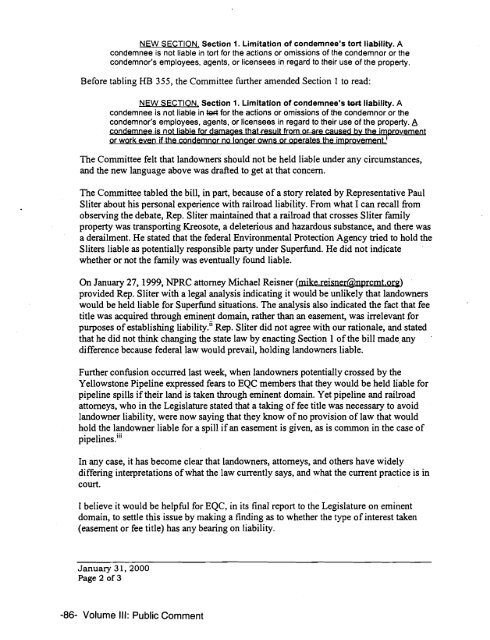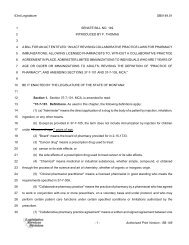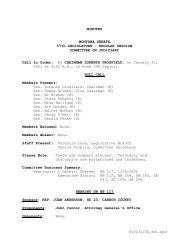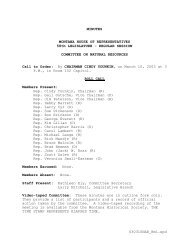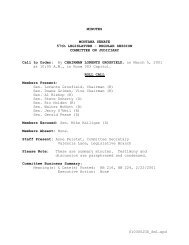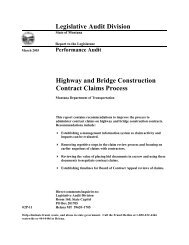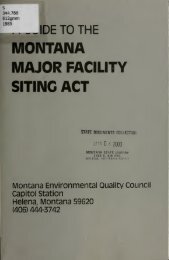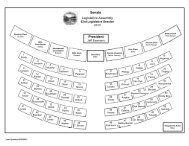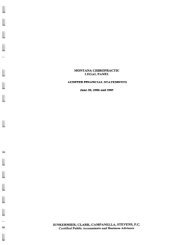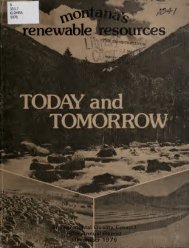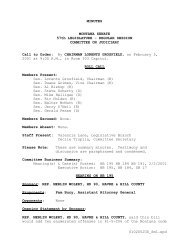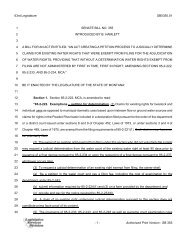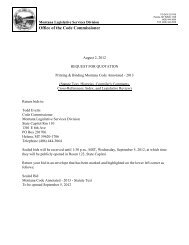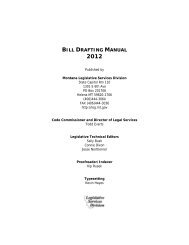Public Comment. Volume III - Montana Legislature
Public Comment. Volume III - Montana Legislature
Public Comment. Volume III - Montana Legislature
You also want an ePaper? Increase the reach of your titles
YUMPU automatically turns print PDFs into web optimized ePapers that Google loves.
NFW SECTION, Section 1. Limitation of condemnee's tort liability. A<br />
condemnee is not liable in tort for the actions or omissions of the condemnor or the<br />
condemnor's employees, agents, or licensees in regard to their use of the property.<br />
Before tabling HB 355, the Committee further amended Section 1 to read:<br />
NFW SECTION, Section 1. Limitation of condemnee's W liability. A<br />
condemnee is not liable in W for the actions or omissions of the condemnor or the<br />
condemnor's employees, agents, or licensees in regard to their use of the property. A<br />
~ondemnee is not liable for dmaes that~esult from or-are wsed bv the imo~ovement<br />
or work even if the condemnor no lonaer owns or ooerates the imorovement;<br />
The Committee felt that landowners should not be held liable under any circumstances,<br />
and the new language above was drafted to get at that concern.<br />
The Committee tabled the bill, in part, because of a story related by Representative Paul<br />
Sliter about his personal experience with railroad liability. From what I can recall from<br />
observing the debate, Rep. Sliter maintained that a railroad that crosses Sliter family<br />
property was transporting Kreosote, a deleterious and hazardous substance, and there was<br />
a derailment. He stated that the federal Environmental Protection Agency tried to hold the<br />
Sliters liable as potentially responsible party under Superhd. He did not indicate<br />
whether or not the family was eventually found liable.<br />
On January 27, 1999, NPRC attorney Michael Reisner (~ike.reisner~,nprcrnt.org)<br />
provided Rep. Sliter with a legal analysis indicating it would be unlikely that landowners<br />
would be held liable for Superfund situations. The analysis also indicated the fact that fee<br />
title was acquired through eminent domain, rather than an easement, was irrelevant for<br />
purposes of establishing liability." Rep. Sliter did not agree with our rationale, and stated<br />
,<br />
that he did not think changing the state law by enacting Section 1 of the bill made, any<br />
difference because federal law would prevail, holding landowners liable.<br />
Further confusion occurred last week, when landowners potentially crossed by the<br />
Yellowstone Pipeline expressed fears to EQC members that they would be held liable for<br />
pipeline spills if their land is taken through eminent domain. Yet pipeline and railroad<br />
attorneys, who in the <strong>Legislature</strong> stated that a taking of fee title was necessary to avoid<br />
landowner liability, were now saying that they know of no provision of law that would<br />
hold the landowner liable for a spill if an easement is given, as is common in the case of<br />
pipelines.iii<br />
In any case, it has become clear that landowners, attorneys, and others have widely<br />
differing interpretations of what the law currently says, and what the current practice is in<br />
court.<br />
I believe it would be helpful for EQC, in its final report to the <strong>Legislature</strong> on eminent<br />
domain, to settle this issue by making a finding as to whether the type of interest taken<br />
(easement or fee title) has any bearing on liability.<br />
January 3 1,2000<br />
Page 2 of 3<br />
-86- <strong>Volume</strong> Ill: <strong>Public</strong> <strong>Comment</strong>


